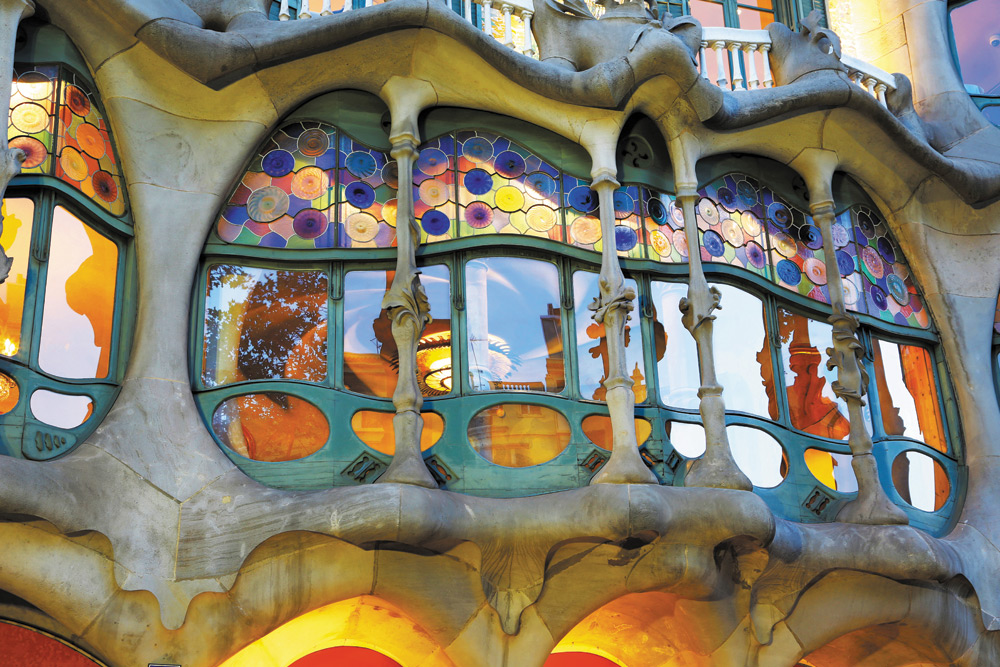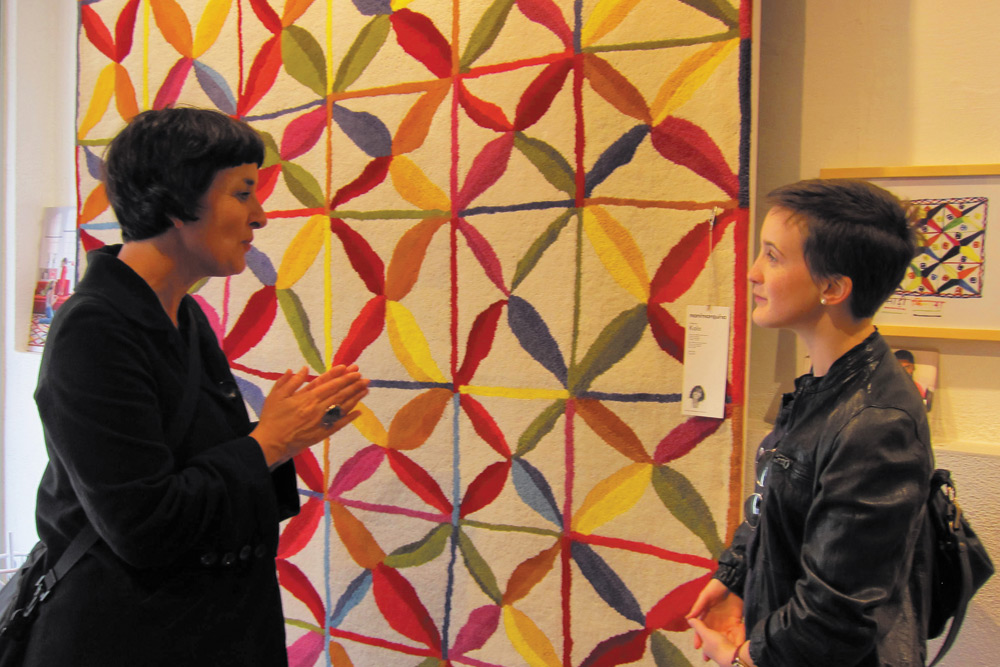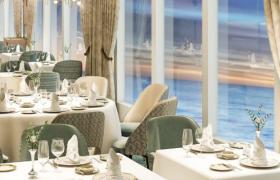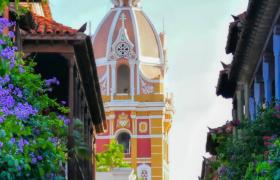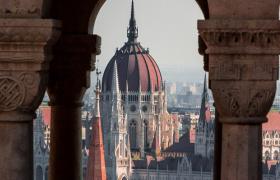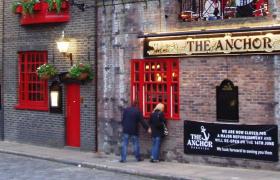On any given morning, and certainly once the holiday season kicks off in Easter week, Barcelona’s old town is rammed with tour groups. Large numbers are led around the facades of the city’s medieval cathedral by a guide with a microphone, umbrella and strong accent, whilst others maybe seeing the sights from an official tourist bus, learning about the interminable progress of the Sagrada Familia or the way the city physically transformed for the 1992 Olympic games via a pre-recorded, multilingual narrative.
In other locations across the city, perhaps a neighbourhood market or a disused bomb shelter, visitors will be having a very different experience. They might be discovering the quirks of Catalan cuisine with a native chef or cookbook writer, or learning about the horrors of the Spanish Civil War with a historian. Many of these seminars are organised by Context – a pioneer provider of ‘slow’ travel experiences.
Context caps its group sizes at six people, discreetly viewing museums, historical sites and galleries (like Gaudi's works in Barcelona) without microphones or name tags.
Context was started in 2003 in by Paul Bennett and his wife Lani. When not traversing the world in a sailboat with his family, Paul was writing award-winning stories on architecture and design. Whilst living in Rome, he was asked by friends and friends of friends to show them the eternal city’s secret gardens. Demand grew, and Context, described as 'Tours for the Culturally Curious, was born.
"When we first started our tagline was 'experience of place'," says Bennett, who is currently based in Sydney whilst expanding Context into Australia. “We had forever been advocating local engagement. Our tours are different from the typical ‘vanilla’ tour in so much as our guides deviate from the stock narrative. Our clients may be led into an artist’s studio, or be shown some secret digs in the Colosseum. It’s very enriching.”
In essence, Context is a 1000-odd strong network of ‘docents’; academics, teachers, historians, writers and assorted experts in their field living in the world’s greatest cities. Unlike standard tour guides, who are generally instructed to follow a provided script, Context’s docents devise their own, be it on everyday life in Ancient Athens or, in my case, the social and political context of Barcelona’s contemporary design culture. We research, write, perfect and 'own’ our tours, and are therefore afforded the flexibility to be able to tweak them according to our client’s tastes and interests.
'Docent', Suzanne Wales, exploring the social and political context of contemporary design culture on the Made in Barcelona: Design Tour. Source: Context
German-born, US-educated and Parisbased Charlotte Lacaze is one of Context’s most veteran guides. After retiring from teaching art history at the American University in Paris, she was approached by Paul to become one of his first docents outside of Rome. “For 30 years I had taught my own course, so with Context I was able to re-purpose this knowledge,” she says. “One of the reasons I gave up teaching is because I was getting tired of what I considered to be very passive reactions from most of my students. The people I meet through Context are different – they are so engaged.”
Context’s docents are now sharing their knowledge to engaged visitors in some 36 cities across Europe, Asia, North America, South America and most recently Australia. As well as the more obvious themes, such as shopping in Venice or family tours of the British Museum, travellers can delve into such esoterica as the history of cocktail culture in New York or follow in the footsteps of Evita Peron in Buenos Aires. Anticipating a growing demand for experiential travel experiences, Context has recently added mosaic workshops in Naples, fresco painting in Florence and instruction in Zen meditation from a Buddhist priest in Kyoto. We would never lead our clients scaling over rocks or anything like that,” says Paul. “But any city that has layers of culture and history – that’s where the Context model works.”
For a longer 'slow' travel experience: 12 Europe River Cruising Questions Answered
On The Pub Trail: Tour The UK's Most Historic Watering Holes
Tourism is a double-edge sword in many European cities. Whilst most locals are aware of the economic and social benefits its brings, others, especially those in cities like Barcelona where historical and residential hubs share the same public space, are starting to feel infringed by the hoards. (Tellingly, Barcelona’s authorities have recently restricted the hours tourists can visit La Boqueria, the city’s famous market). Context puts a cap of six people on their groups. By doing so, both clients and guide can provide a less evasive experience, discreetly viewing museums, historical sites and galleries without the need for microphones or name tags.
Oftentimes the docent will sit down with the clients over coffee at the end of the walk (Context tours are mostly done on foot) padding out the themes they have discussed over the past few hours, or recommending further sites to see. The idea is that the client ‘takes home’ some knowledge, rather than just being marched around seeing pretty things.
“Seeing pretty things doesn’t make much sense to me unless there is a narrative behind it,” adds Paul. “As well as being experts in their field, our docents are chosen for their teaching ability. We want our clients to have a transformative experience. Sort of like that feeling you get after reading a good book.”
Experience a Japanese tea ceremony in Kyoto on the Context tour, The Way of Tea.
5 Context Tour Ideas
The Way of Tea, Kyoto
Tea was brought to Japan in the 7th and 8th centuries by Buddhist monks returning from China. The Japanese tea ceremony, often referred to as the Way of Tea, is a central part of Japanese culture, in which matcha (powdered green tea) is presented in a series of carefully choreographed steps.
From Tudor to McQueen: The History of British Fashion, London
This Context tour takes dedicated followers of fashion on a journey though 250 years of ‘la mode’ in the newly opened fashion collection at the Victoria and Albert Museum to discover why London was, and is, a centre for the fashion-conscious.
Ottoman Feast, Istanbul
Today's Turkish cuisine has its roots in the 17th century Ottoman Empire. At the famous Asitane restaurant, hear the history of the Ottoman court and its lavish parties. While chefs serve a series of traditional dishes, learn the origins of Ottoman cuisine and the significance of each dish through history.
Big Dig, Boston
In the 1990s, Boston embarked on one of the most ambitious urban engineering projects in history: the burying of its highway system to free its historic centre from traffic. Join a local architect or architectural historian for the inside story on this project and how it changed one of the USA's iconic cities.
The Birth of Bossa Nova, Rio de Janerio
Music is firmly ingrained in Brazilian culture. From the early rhythms of Samba to today's Musica Popular Brasileira, you cannot overlook one of the most influential periods in this trajectory: Bossa Nova. On a walk from Copacabana to Ipanema, dig down to the roots of this social, political and musical revolution.
Prices vary between Context walking tours and whether you choose a private or group walk.

